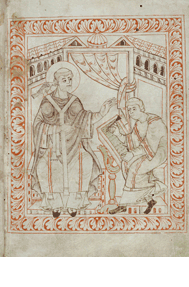EXCERPTS AND ABRIDGEMENTS OF THE WORKS OF GREGORY THE GREAT
|
As personal secretary to the pope, Paterio, composed the Liber testimoniorum, a collection of exegetical extracts from the pontiff’s works (mostly from the Moralia in Iob) organised and arranged in the order of the books of the Bible, at Gregory’s request in all likelihood. Laidcenn mac Baith, an Irish monk who lived in the Monastery of Clonfertmulloe in the mid-7th century, composed the earliest abbreviation of Gregory the Great’s Moralia in Iob. The Gregorian excerpta, extracted by Taione of Saragossa († 683) (and later included with the Sententiarum libri quinque), constitute one of the earliest and most important indirect sources of the pope’s works. Around the year 800 an abridgement of the Moralia (formerly attributed to Eudes of Cluny) was made, probably in the circle of Visigothic eccleasiastics who worked closely with the Carolingian court. The Speculum by Adalbert, generally identified as a scholasticus who lived in Metz during the mid-10th century, is an anthology of the Moralia in four books, which include those passages of the work considered of greatest interest in teaching behaviour.
|


